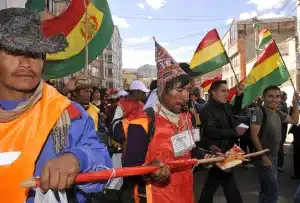Headlines
Bolivia: A Brief Overview of Its History and Culture

Bolivia has a long and rich history that spans thousands of years. It was home to the Tiwanaku civilization, which reached an advanced level of culture and development around Lake Titicaca. Later, it became part of the Inca Empire, which expanded its territory and influence in the 15th and 16th centuries.
See population, official language and more…

Bolivia
Bolivia was colonized by Spain in the 16th century and became a major source of silver for the Spanish crown. The city of Potosí was one of the wealthiest and largest cities in the world at that time. Bolivia suffered from exploitation, oppression, and social unrest under Spanish rule, and joined the wars of independence that swept across South America in the early 19th century1.
Bolivia declared its independence in 1825, and named itself after Simon Bolivar, the liberator of several South American countries. The first constitution of Bolivia was written by a constituent assembly that same year, and established a centralized government with executive, legislative, and judicial branches based on the United States model.
Bolivia faced many challenges and conflicts in its history, such as wars with its neighbors, political instability, social inequality, economic crises, ethnic diversity, and environmental issues. It also underwent several constitutional reforms and changes of government, some of them violent and some of them democratic. The current constitution of Bolivia was approved by a referendum in 2009 and grants more rights and autonomy to the indigenous peoples, who make up a majority of the population.
Pre-Columbian period: Bolivia was inhabited by various indigenous groups, such as the Aymara, the Quechua, the Guaraní, and others. The most prominent civilization was the Tiwanaku, which flourished around Lake Titicaca from the 3rd to the 12th century CE. They built impressive monuments, developed agriculture and trade, and had a complex social and religious system.
Colonial period: Bolivia was invaded by the Spanish in the early 16th century and became part of the Viceroyalty of Peru. The Spanish exploited the rich silver mines of Potosí and other regions, and imposed their culture, religion, and laws on the native population. The indigenous people resisted and rebelled against the colonial oppression, led by figures such as Túpac Katari and Bartolina Sisa.
Independence period: Bolivia joined the wave of independence movements that swept across South America in the early 19th century, inspired by the ideas of Simon Bolivar and other liberators. After several battles and campaigns, Bolivia declared its independence on August 6, 1825, and adopted its first constitution. The new republic faced many challenges, such as political fragmentation, economic dependence, and social inequality.
War period: Bolivia was involved in several wars with its neighbors in the 19th and 20th centuries, which resulted in territorial losses and economic hardships. The most significant conflicts were the War of the Pacific (1879-1884) with Chile, which cost Bolivia its access to the sea; the War of the Acre (1899-1903) with Brazil, which ceded part of the Amazon region; and the Chaco War (1932-1935) with Paraguay, which ended in a stalemate over a disputed area rich in oil.
Revolution period: Bolivia experienced a series of social and political changes in the mid-20th century, known as the National Revolution (1952-1964). The revolution was led by a coalition of nationalist, socialist, and communist parties, and introduced reforms such as universal suffrage, land redistribution, nationalization of mines, education expansion, and recognition of indigenous rights. The revolution also faced opposition from conservative sectors, military coups, and US intervention.
Democracy period: Bolivia returned to democracy in 1982, after a long period of dictatorship and instability. The democratic era was marked by economic liberalization, constitutional reforms, social movements, ethnic diversity, and political pluralism. The most notable event was the election of Evo Morales in 2005, the first indigenous president of Bolivia. Morales implemented a leftist agenda that included a new constitution, social programs, anti-imperialism, and environmentalism. He also faced criticism for his authoritarian tendencies, corruption scandals, and controversial policies.





